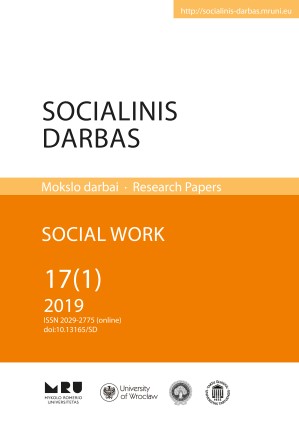NESMURTINIO BENDRAVIMO INTERVENCINĖS PROGRAMOS POVEIKIS PROGRAMOS DALYVIŲ SOCIALINEI ELGSENAI: SISTEMINĖS TYRIMŲ ANALIZĖS APŽVALGA
IMPACT OF THE NONVIOLENT COMMUNICATION INTERVENTION PROGRAM ON THE SOCIAL BEHAVIOR OF THE PARTICIPANTS: OVERVIEW OF THE SYSTEMIC RESEARCH ANALYSIS
Author(s): Eglė Visakavičiūtė, Rita BandzevičienėSubject(s): Language and Literature Studies, Communication studies, Behaviorism
Published by: Mykolas Romeris University
Keywords: social behavior; empathy quotient; nonviolent communication; effectiveness of the NVC program;
Summary/Abstract: The Nonviolent Communication interventional program (NVC), of which a prototype developer is an american psychologist and mediator of conflicts M. Rosenberg (2005), has been applied to improve social behavior, interpersonal and social relationships, conflict resolution and prevention from violence. The aim of this work is to systematically analyze empirical studies, which have evaluated the impact of the NVC program on the social behavior of its participants. Computerized bibliographic databases EBSCOhost, Scopus, Sage, Taylor & Francis were used to search for scientific publications. Systematic analysis selection includes peer-reviewed articles on the impact of the NVC intervention program, published until 13th of July of 2018. In order to answer the questions of systemic analysis, the survey includes various types of research that meet three criteria: 1) the interventional NVC method was used in the studies, 2) the evaluation of the constructs was made before and after the intervention, 3) the results in the qualitative studies were followed by the results after the applied intervention. The main questions of systematic analysis are: 1) What social behavior constructs are explored when assessing the impact of the NVC interventional program? 2) Is the NVC interventional program an effective tool for changing the various social behavior constructs of the participants? In addition, the aim was to assess the limitations and opportunities of research on the effectiveness of the NVC interventional program.An overview of the research has shown that participants‘ abilities of empathy, expression of negative emotions, ability to cope with stress, awareness and relationship-enhancing communication in conflict situations has been investigated most often while using the NVC interventional program. Individual research identified individuals‘ participation in conflicts, risk of crime (of recidivists), marital satisfaction, and the ability to transfer nonviolent communication skills to personal life. The research methodology is differing, the authors refer to the main principles of the NVC program, but it is modeled depending on the circumstances (age of the participants, situation of life, circumstances of the research, etc.). In most cases (75%), significant, positive changes in the above constructs were identified, assessed at both individual and group levels.Summarizing the results of this systematic review it can be assumed that the NVC interventional program can be an effective tool for changing the patterns of social behavior of individuals and groups, as it enhances the communicative empathy, sensitivity to one’s and other needs and experiences, develops the ability to verbalise, empathetically deal with stress and conflicts. However, a small number of studies and methodological limitations encourage the continuation of research on the effectiveness of the NVC interventional program, taking into account the possible impact of the situational factors that may affect both the elements of the program and the characteristics of the participants on its effectiveness.
Journal: Socialinis darbas
- Issue Year: 17/2019
- Issue No: 1
- Page Range: 102-121
- Page Count: 20
- Language: Lithuanian

